2019 Maple Leaf Award
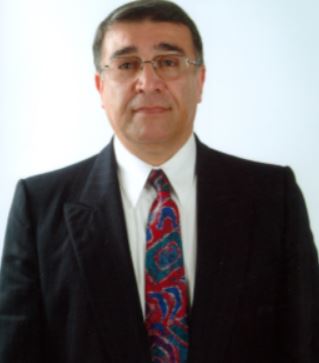
Dr. Ali Madani has made significant contributions in teaching, research and service to academia and profession over the past 30 years. Dr. Madani was a professor at the Agricultural Engineering Department, Nova Scotia Agricultural College, Truro, Nova Scotia from 1984 to 2011. He was appointed as an adjunct professor at McGill University in 2011. He has served the American Society for Agricultural and Biological Engineers (ASABE) and Canadian Society for Bioengineering (CSBE) in various roles such as Chair, ASAE Drainage Research Committee, Chair of Drainage Benefits of the ASAE, Chair of Advisory Committee on Soil & Water of Atlantic Committee on Agricultural Engineering, Editor for the CSBE Newsletter, and Chair, CSBE Awards Committee. He also served as the CSBE Manager/Secretary from 2011 to 2013. Dr. Madani supervised, co-supervised, and was involved in educating more than 50 postgraduate students, post-doctoral fellows, visiting professors/scientists, etc. Dr. Madani and his research team received significant research funding to support these students and their research. He has published more than 250 papers in refereed journals, refereed conference proceedings, and conference papers. He is very well recognized for his contributions nationally and internationally. Dr. Madani is a worthy recipient of the Maple Leaf Award.
2019 Young Engineer of the Year Award
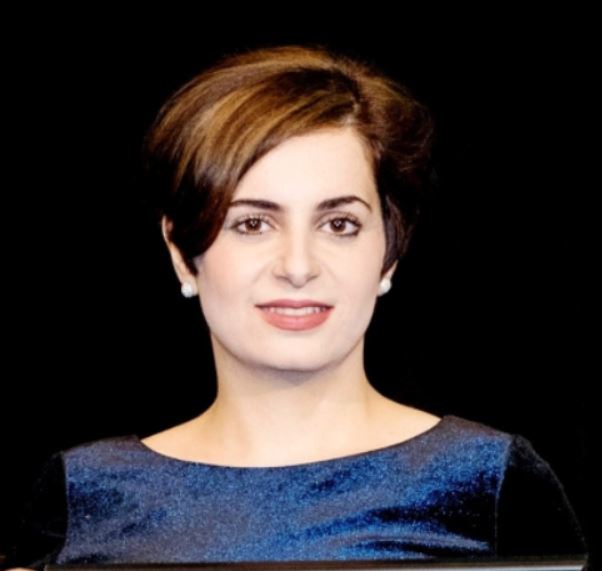
Fahimeh Yazdan Panah is the Research and Technical Development Director at Wood Pellet Association of Canada (WPAC). Fahimeh joined WPAC in April 2019. Prior to joining WPAC, Fahimeh Yazdan Panah was a Research Associate in Biomass and Bioenergy Research Group (BBRG) at the University of British Columbia and the founder of Spark Biomass Consulting Inc. She has been engaged in research and discovery in the emerging area of bioenergy for over 12 years and have managed bio-product projects for a variety of clients including governments, manufacturers and technology developers. She led biofuel densification, pretreatment, storage and handling research studies in lab and pilot scale and has co-authored more than 80 technical reports and peer-reviewed publications in the field. Fahimeh also serves as the Project Lead within ISO Technical Committee 238 (Solid Biofuels) and as the Chair within ISO Technical Committee 300 (Solid Recovered Biofuels). She has received her PhD and MASc from Chemical and Biological Engineering Department at the University of British Columbia (UBC) and she holds a bachelor’s degree from Amirkabir University of Technology.
Fahimeh is a worthy recipient of the Young Engineer of the Year Award.
2019 Glenn Downing Award
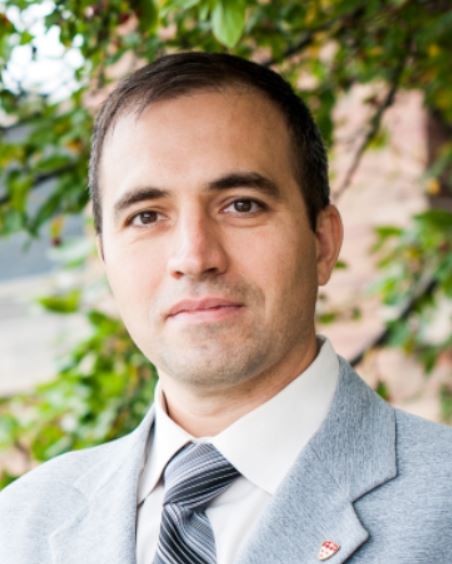
Originally from Kyiv, Ukraine, Dr. Viacheslav Adamchuk obtained a mechanical engineering degree from the National Agricultural University of Ukraine in his hometown. Later, he received both MS and PhD degrees in Agricultural and Biological Engineering from Purdue University. Shortly after graduating , Dr. Adamchuk began his academic career as a faculty member in the Biological Systems Engineering Department at the University of Nebraska-Lincoln. There, he taught university students, conducted research and delivered outreach programs relevant to precision agriculture, spatial data management, and education robotics. Also he was involved in the Organisation for Economic Co-operation and Development (OECD) tractor testing program and developed a methodology to validate the accuracy of tractor auto-guidance systems. After almost ten years in Nebraska, Dr. Adamchuk was appointed to the Bioresource Engineering Department at McGill University, while retaining his adjunct status at the University of Nebraska-Lincoln.
Dr. Adamchuk’s research has focused on the development and deployment of on-the-go soil sensing technology to enhance the economic and environmental benefits of precision agriculture. Since he began his research in the mid 90s, Dr. Adamchuk developed and evaluated a fleet of on-the-go soil sensor prototypes capable of mapping physical and chemical soil attributes while moving across an agricultural field. These sensors produce geo-referenced data to quantify spatial soil heterogeneity, which may be used to prescribe differentiated soil treatments according to local needs. Along with his work on sensors, Dr. Adamchuk has conducted numeric analysis of the agro-economic value of sensor-based information to aid in the successful deployment of emerging on-the-go sensing technology. Through recent studies on soil and crop sensor fusion and data clustering, he was able to further investigate the challenges faced by early adopters. Through his outreach activities, Dr. Adamchuk has taught a number of programs dedicated to a systems approach in adopting smart farming technologies around the world. Dr, Adamchuk is a worthy recipient of the Glenn Downing Award.
2019 John Clark Award
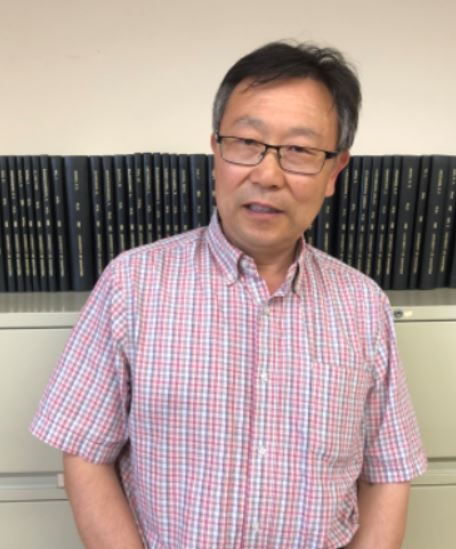
Dr. Fuji Jian is a professional engineer and assistant professor in the Department of Biosystems Engineering at the University of Manitoba. Dr. Jian received his Ph.D at the University of Manitoba in 2003, and excellence of his Ph.D. studies was awarded as “Governor General’s Gold Medal for outstanding graduate studies academic achievement in Canada” and the “CSAE/SCGR 2004 Ph.D. Thesis Award”. After working for a grain storage company (OPI System, Calgary, Canada) for 5 years, he returned to academia as an instructor in 2010 and assistant professor in 2015.
Fuji’s research interests are in the area of post-harvest grain quality, stored-product protection and sensor development with the sole purpose to enhance food safety and security. He is the leading authors in 62 of 76 referred journal papers and book chapters, and authorized and co-authorized more than 30 conference papers. These publications covered: 1) mathematical modeling of grain storage ecosystems; 2) insect biology and ecology inside stored grain bulks; 3) sampling inside grain bins; 4) physical property of stored grain bulks; 5) safety storage of grain and monitoring; 6) insect control and pesticide resistance; 7) grain aeration and drying; 8) sensor development; 9) biomass processing; and 10) particle segregation. Fuji published more than 20 mathematical models and his expertise in mathematical modeling and grain storage ecosystem has been instrumental in revitalisation of grain storage monitoring industry.
Fuji has taught Grain Storage/Crop Preservation, Plant and Animal Physiology for Engineers, Unit Operation, Transfer Phenomena, and Modelling and Simulation of Biological Systems. He is currently supervising/co-supervising 8 M.Sc/PhD students. His group pioneered the study on the use of steam to control insects in stored grain, application of compact microwave device for monitoring insects inside grain bulks, stored-product insect density estimation by using electronic traps, identification of stored grain insects using image restoration classifier neural network, and particle segregation during grain loading and unloading. Dr. Jian is a worthy recipient of the John Clark Award.
2019 Industrial Award

Established in 1964, Conviron is the world leader in the design, manufacture and installation of controlled environment systems for plant science research. Conviron’s reach-in plant growth chambers, walk-in rooms and Argus Control Systems (a Conviron company) provide precise, uniform, and repeatable control of temperature, light, humidity, dehumidification, CO2, and other environmental conditions. All environmental parameters can be remotely programmed, monitored and analyzed with unparalleled accuracy and convenience.
Conviron’s projects range from small single-chamber installations to large scale, multi-chamber facilities in some of the most prestigious corporate, university and research institutions in over 90 countries around the world. Our innovative design and manufacturing expertise has established Conviron as the global industry leader with products that are proven, reliable and robust.
As a fully integrated, ISO 9001 certified supplier, our services encompass the entire project life cycle - from project consultation to manufacturing, installation, commissioning, and on-going maintenance and service. With a staff that includes specially trained engineers, technicians and controls experts, Conviron is well equipped to supply both standard and custom applications for our diverse client base. Conviron’s head office is in Winnipeg, Canada with branch facilities in the United States, the United Kingdom, Australia and a global network of over 40 distributors around the world. Learn more at www.conviron.com. Conviron is a worthy recipient of the CSBE/SCGAB INDUSTRIAL AWARD.
2019 John Ogilvie Research Innovation Award
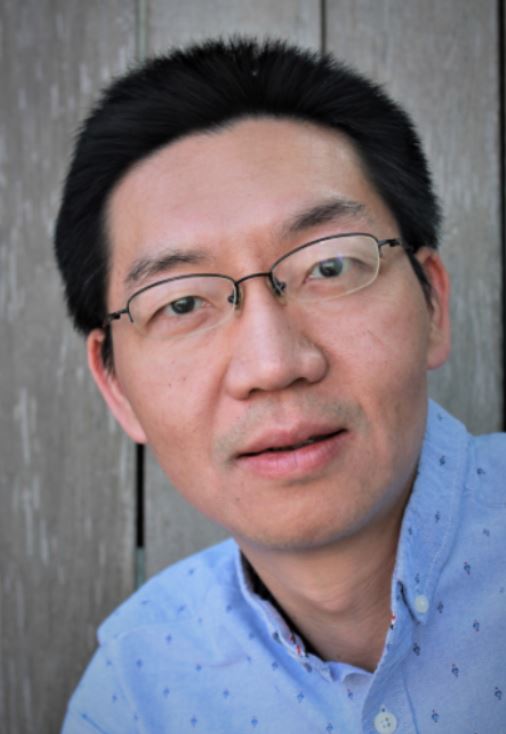
Contribution: Development and fabrication of “smart” bacteria-responsive wound dressings
Dr. Song Liu is a professor in the Department of Biosystems Engineering. He directs the Biomaterials Synthesis and Polymer Surface Engineering Laboratory at the University of Manitoba in Winnipeg, MB. He earned a PhD in Fiber and Polymer Science from the University of California, Davis.
Dr. Liu’s expertise lies in polymer/organic chemistry, biomaterials, nanotechnology and microbiology. The main focus of Dr. Liu’s research career is to approach the prevention and treatment of infectious diseases from the perspective of chemistry, nanotechnology and biomaterials. He has received over 1.55 M CAD in research funding as PI and 2.7 M CAD as Co-PI or collaborator from various granting agencies (including NSERC, CIHR, CFI and Research Manitoba) for his pioneering work in developing new broad-spectrum biocides, rechargeable biocidal coatings and “smart” polymeric materials.
Dr. Liu has published 47 peer-reviewed articles in prestigious journals such as Advanced Functional Materials (impact factor (IF) 13.325), Progress in Surface Science (IF 9.000), ACS Applied Materials & Interfaces (IF 8.097), Nanoscale (IF 7.233), Nanomedicine: Nanotechnology, Biology, and Medicine (IF: 6.500), Acta Biomaterialia (IF 6.383), Advanced Healthcare Materials (IF 5.609), Carbohydrate Polymers (IF 5.158), and Journal of Material Chemistry B (IF 4.776). Dr. Liu’s research has also had successful translation to industry with six patent application, one granted patent and two licensing agreements. He has won the 2012 Rh Award in Interdisciplinary Studies from the Winnipeg Rh Foundation in view of his leadership in interdisciplinary research. He is one of the recipients of 2019 Outstanding Teacher from the University of Manitoba through the Students’ Teacher Recognition program. Dr. Song Liu is a worthy recipient of the John Ogilvie Research Innovation Award.
2019 John Ogilvie Research Innovation Award
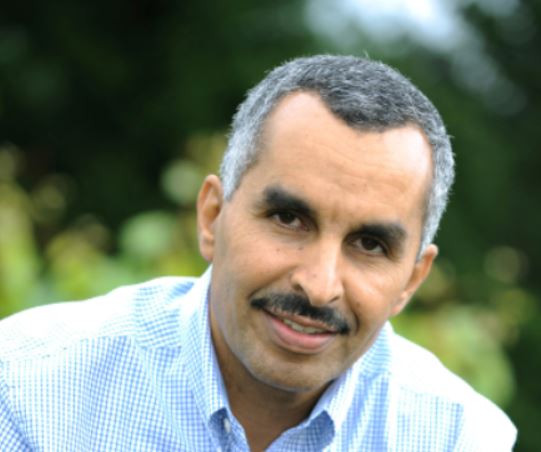
Contribution: A unique and innovative tool to release Trichogramma parasitized eggs in sweet corn for the biological control of the European corn borer
Dr. Mohamed Khelifi is a Full Professor in the Department of Soils and Agri-Food Engineering of Université Laval, Director of the B. Sc. Agri-Environmental Engineering Program, and Director of the M. Sc. Agri-Food Engineering Program. He obtained his B. Sc. Degree in Agricultural Machinery in 1985 from the High Institute of Engineers (Tunisia) and his M.Sc. degree in 1991 and Ph.D. degree in 1996 in Agricultural Engineering from the University of Guelph and Université Laval, respectively.
Dr. Khelifi’s research interests are in the area of engineering of agricultural machinery and equipment, biological control of insect pests, and bioenergy production. Dr. Khelifi developed a unique and innovative tool to release Trichogramma parasitized eggs in sweet corn for the biological control of the European corn borer (US Patent 16/233,216 and Canadian Patent 2991-4999). He also developed an innovative tool to distribute predator insects in potato fields to control the Colorado potato beetle (International Patent WO 148498). His recent research on bioenergy led to the construction and instrumentation of a wheel-mounted commercial press to extract the sugary juice from sweet sorghum and sweet pearl millet biomass for an eventual production of bioethanol and to make wrapped silage bales from the pressing residues to feed the cattle.
Dr. Khelifi has authored or co-authored over 46 peer-reviewed journal articles, 22 proceeding articles, 75 scientific communications, 8 book chapters, and 2 encyclopedia articles. He has supervised/co-supervised 16 M.Sc., 6 Ph.D., and more than 50 undergraduate students. In addition to his teaching, research, and administrative responsibilities, Dr. Khelifi is also assuming the role of faculty advisor for the Université Laval’s ASABE ¼ scale tractor design team (ULtrac) since 2005. Dr. Mohamed Khelifi is a worthy recipient of the John Ogilvie Research Innovation Award.
2019 John Ogilvie Research Innovation Award
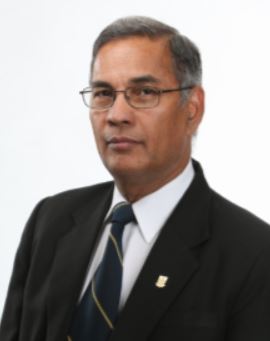 Contribution: Horizontal airflow grain dryer
Contribution: Horizontal airflow grain dryer
Digvir Jayas, PhD is a worthy recipient of the John Ogilvie Research Innovation Award. Drying of grains and oilseeds is a necessity on Canadian farms and around the globe. The usual drying method is to force atmospheric air vertically through stored bulks. Dr. Jayas was among the firsts to demonstrate experimentally that the airflow resistance when air is forced through grain in a horizontal direction is significantly lower than the resistance in the vertical direction. Later using micro-computed tomography on bulk samples of grains and analysing pore structures of grain samples, it was shown that average pore diameter is larger in horizontal direction than in vertical direction, hence the low resistance to airflow in horizontal direction. He conceptualized a horizontal airflow dryer and publicized it through farm media in 1990s rather than patenting it. He continued to promote the idea throughout the world. Now many companies and organizations are constructing and implementing horizontal airflow dryers in many countries. With increased use of horizontal dryers, grains is dried more uniformly thus reducing over drying of some sections of grains and not drying to desired moisture in other sections of grains as well as grain is dried more efficiently and using less energy. This should result in reduced cost to the farmers. He is the father of horizontal airflow drying.
2019 Fellow Award

Dr Venkatesh Meda is being recognized for his outstanding and significant contributions to Agricultural, Food and Biological Engineering, particularly in the areas of Post-harvest Engineering, and value-adding processing of foods. He has demonstrated leadership in the field at local, national and international levels. Apart from being a dynamic researcher, Dr. Venkatesh is also an enthusiastic scholar/educator and has trained several graduate and postdoctoral fellows. His effort has contributed in solving some of the problems related global food production, preservation and supply chain management.
Dr. Meda’s effort in establishing International collaborative research and development partnerships is well recognised, particularly through his successes through the Canadian Common Wealth Scholarships with DFATD (Foreign Affairs, Canada), EU (European Union)-ISEKI-Mundus Food Net, and ISTP (DFATD) grants. He has extensively participated in strategic discussion(s) /seminars conducted by CIDA, World Bank, Global Institute for Food Security (GIFS), food safety, ICRISAT (India) and other International rural development topics on post-harvest engineering.
Dr. Meda was awarded as ‘distinguished Professor’ by Government of India’s Center of Excellence in the Ministry of Food Processing Industries (NIFTEM; 2014, 2018) for his outstanding contributions in the field of food, chemical & Biological Engineering and management/entrepreneurship. He has published at high quality journals in the related fields.
Dr. Meda’s enthusiasm continues to thrive on integrating approaches to food systems teaching, research and development activities including community level collaboration(s), ultimately addressing the global food security challenges. He has been an active CSBE member since 1998. Dr. Meda is a worthy candidate for the Grade of CSBE/SCGAB Fellow.
2019 Fellow Award
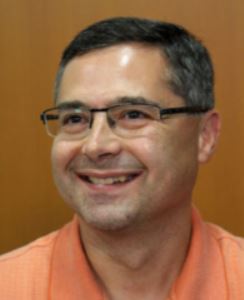
Dr. Danny Mann started this journey with an undergraduate major in the Department of Agricultural Engineering, University of Manitoba, and he subsequently pursued graduate studies in the same department. It is worth to mention that he was the recipient of the Department Undergraduate Student Governor General’s Gold Medal. After obtaining a PhD, no other job would be as perfectly suited for Danny than a job in this engineering field. It was for this reason that he set his roots as a faculty member in the Department of Biosystems Engineering, University of Manitoba. As a teacher, Danny always put students first, with learning as the prioritized objective. He has participated in more than 30 professional development activities and workshops associated with engineering education. His dedications to engineering education are demonstrated by the numerous teaching awards he received. One of the most notable events in his career was when he earned the Graduating Class Award for Excellence in Teaching. Being recognized by students is the undoubtedly most satisfaction as an educator he has felt thus far. As a researcher, Danny has been active in the field of precision agriculture and automation. As the Department Head for eight years, he successfully renewed his NSERC Discovery grants, which is most evidently demonstrated in increased levels of productivities in training HQPs and publications. As Department Head, not only is he available to answer our questions; he solves our problems. His effective leadership can be demonstrated by two facts: the significant increase in the student enrollment over the years, and the friendly working environment within the department. As an individual, Danny reflects before speaking, and handles all matters in a pleasant, respectful, and inoffensive manner. His personal qualities include being organized, punctual, responsible, calm, and most importantly, being fair and trustworthy. In light of his strong contributions, Dr. Mann is elected to the Grade of CSBE/SCGAB Fellow.
ASABE ¼ Scale Tractor Student Design Competition
Design and construction of a four-wheel-drive tractor taking into consideration the rules specified by the American Society of Agricultural and Biological Engineers (ASABE)
Université Laval, Équipe ULtrac - Jasmin Fréchette (Leader), Clovis Courchesne, Frédérik Daigneault, Étienne Marineau-Bélanger, Claudia Gagnon, Simon Le Bouthillier, William Falcon, Christophe Rainville, Anthony Voghell, Jolaine Mallet
McGill University, Mutrac - A. Pille (Captain), K. Al-Itani , C. Al-Shami, A. Audi, N. Audi, A. Calabrese, K. Courchesne, A. Guttormson, J. Harms, I. Karovitch , A. Dickson, J. Lan, E. Larocque, A. Leak , M. Leclerc, J. Lespine, H. Maček, M. Marmette , L. McGuire, S. McGuire, C. Miller, B. Rasmussen, Y. Saeed , J. Smith, J. St-amour, V. Paepcke, C. Wells, Y. Yu
CSBE/SCGAB FOUNDATION Undergraduate Scholarship
Recognizes academic excellence among student members of the Society. The Scholarship is awarded each year to the student member of the Society with the highest GPA in the preceding semester.
University of Manitoba – Laurissa Bridgeman
McGill University – Elodie Chatel
Université Laval - Camille Michaud-Girard
University of Prince Edward Island - Maggy McGrath
Dalhousie University - Derrick Ouma
Graduate Thesis Award (PhD)
McGill University - John Quilty for his thesis entitled “An ensemble wavelet-based stochastic data-driven framework for addressing nonlinearity, multiscale change, and uncertainty in water resources forecasting” (Advisor: J. Adamowski)
University of Alberta - Madhumita Patel for her thesis entitled “Production of Renewable Diesel from Lignocellulosic biomass through fast pyrolysis and hydroprocessing technology” (Advisor: A. Kumar)
University of Saskatchewan - Dandan Huang for his thesis entitled “Odour and Gas Emissions, Odour Impact Criteria, and Dispersion Modelling for Dairy and Poultry Barns” (Advisor: H. Guo)
University of Manitoba - Rani Puthukulangara Ramachandran for a thesis entitled “Numerical Modelling of Superheated Steam Drying of Distillers' Spent Grain Pellet‐A Single Element Approach” (Advisors: J. Paliwal and S. Cenkowski)
Université Laval – Yann Périard Larrivée for a thesis entitled « Impact de la genèse anthropique des sols de canneberge sur la capacité de drainage / Impact of anthropogenic genesis of cranberry soils on drainage capacity” (Advisors: S. Gumière and A. Rousseau)
Graduate Thesis Award (MSc)
University of Guelph - Ramandeep Kaur Sandhu for a thesis entitled "Evaluation of the effectiveness of light emitting diodes in post-harvest shelf life extension of blueberries" (Advisor: A. Singh).
University of Guelph - Kelsie McNeill for a thesis entitled " Time Series Analysis and Statistical Model Development for Food and Water Availability in the Grand River Watershed" (Advisor: A. Binns and A. Singh).
University of Guelph - Baljeet Kaur for a thesis entitled "Assessment of Water Security in Grand River Watershed, South-western Ontario, Canada" (Advisor: P. Daggupati).
University of Guelph - Taranjot Singh Brar for a thesis entitled " Modification of the LTHIA GIS model to assess the water quantity and quality of Canadian Great Lakes watershed" (Advisor: P. Daggupati).
University of Guelph - Charles Harrison Brodie for a thesis entitled " Development of Accessible Hyperspectral Imaging Architectures Towards Biomedical Applications " (Advisor: C. Collier).
McGill University - Rachit Saxena for her thesis entitled “Effect of processing on bovine milk quality attributes for human consumption” (Advisor: V. Raghavan)
McGill University - Qian Lei for her thesis entitled “Microwave hydrothermal carbonization of orange peel waste” (Advisor: V. Raghavan)
Dalhousie University – Karen Esau for her thesis entitled “Effective Debris Removal Methods for Mechanical Wild Blueberry Harvester” (Advisor: Q. Zaman)
University of Saskatchewan - Jason Cousins for his thesis entitled “Title: Development of a Fast Gas-Solid Flow Simulation for Control of the Pneumatic Conveying System on Air Seeders (Advisor: S. Noble)
University of Prince Edward Island - Raj Dahal for his thesis entitled “ A study on Biochar for Energy and Composites Applications” (Advisor: B. Acharya)
University of Manitoba - Cliff Dueck for a thesis entitled “Barley bulgur: Effects of drying methods (hot air, microwave, and superheated steam) on cooking qualities, b-glucan fibres, and tocochromanols” (Advisor: S. Cenkowski)
Université Laval - Ariane Dionne for a thesis entitled "Conception et mise à l’épreuve d’un prototype de pulvérisation de pupes de trichogrammes pour la lutte biologique contre la pyrale dans la culture du maïs sucré / Design and testing of a trichogramma pupae spray prototype for biological control of corn borer in sweet corn" (Advisor : M. Khelifi)
Undergraduate Awards
McGill University - Design Project - Bradley Rasmussen and Leo McGuire for their project entitled “Hay moisture sensor design for round bale collection” (Advisors: V. Adamchuk and C. A. Madramootoo)
McGill University - Thesis - Stephanie Greenough and Connie Lafferty for their project entitled “cGreen: Same power, electrified” (Advisors: C. A. Madramootoo and V. Orsat)
Dalhousie University - Design Project - Derrick Ouma, Jack Lynds, Connor Mullins for their project entitled “Development of an Automatic Inter-row Guidance Robot for Strawberry Runner Trimming” (Advisor: T. Esau)
Université Laval - Design Project - Kamgha Kenkouo, Thierry Ismael; Bruno Thibault; Staelle Duchelle Voufo for their project entitled “Conception d’une ligne de production de la pâte de tomate en conserve dans un emballage Tetra Pak/ Design of a production line of canned tomato paste in Tetra Pak packaging” (Advisor: M. Aider)
University of Manitoba - Design Project - Rhianna-Lynn Holter-Ferguson for a project entitled “A novel design for adaptive actively irrigated plant growth cells” (Advisor: N. Balakrishnan)
University of Manitoba - Thesis - Sarah Currie for a thesis entitled “Core-shell polyurethane-polyvinylpyrrolidone electrospun nanofibers for highly sensitive theranostic wound dressings” (Advisor: S. Liu)
University of Manitoba - Thesis - Emily Kiely-Smith for a thesis entitled “The effects of electron donor on the bioremediation of chlorate and hexavalent chromium co-contaminated water” (Advisors: B. Gorczyca and R. Sri Ranjan)
University of Prince Edward Island - Thesis - Skylar Tang for a thesis entitled “Development of an Automated Goniometer for Imaging under Variable Light Conditions” (Advisor: G. McSorley and A. Ahmadi)

